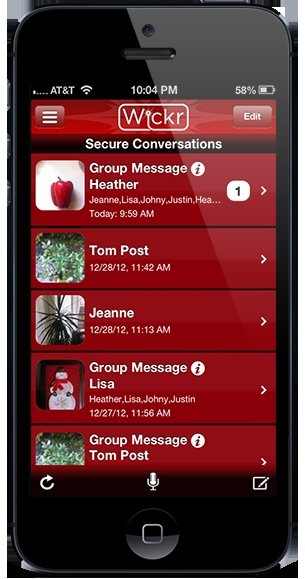


Melvin said that Customs and Border Protection's contracts are for use of the Enterprise version of Wickr, which is designed for business communications, and allows for organizations to appoint administrators who can control messaging settings on the platform, including those regarding deletion. Since 2019, she said, the agency has only used the app in “several small-scale pilots.” “The distribution/use of Wickr is currently under review,” she said in an email.

Melvin, a spokesperson for CBP, said the agency could not comment on pending litigation. CREW is asking CBP to “fully and promptly process CREW’s FOIA request and produce all non-exempt documents immediately.” The agency’s use of Wickr, a messaging app with ‘auto-delete’ features, certainly raises red flags.”ĬREW filed a lawsuit against CBP last month after it failed to respond to a Freedom of Information Act request the nonprofit filed seeking records about its implementation of Wickr. “This has had real consequences for accountability by impeding investigations and oversight of the agency’s activities. “CBP, like ICE and other agencies DHS oversees, has an abysmal track record when it comes to complying with record-keeping laws,” said Nikhel Sus, senior counsel for Citizens for Responsibility and Ethics in Washington (CREW), a nonprofit watchdog group, in a statement. Its auto-deletion feature has made the platform a cause of concern among government record keepers, as well as external watchdogs, who worry that Wickr and other similar apps are creating ways for customs officials to sidestep government transparency requirements. Fallon / AFP via Getty Images)īut little is known about how the agency has deployed the app, which is popular among security-minded people ranging from journalists to criminals. Border Patrol agent shows an incomplete section of the new steel bollard-style border wall on a hillside along the US-Mexico border between San Diego and Tijuana on May 10, 2021, in the Otay Mesa area of San Diego County, Calif. Customs and Border Protection (CBP), which has been criticized by human rights activists and immigration lawyers over what they say are its secretive practices, has spent more than $1.6 million on Wickr since 2020, according to public procurement records.Ī U.S. Wickr was bought by Amazon’s cloud-computing division last June and has contracts with a number of government agencies. The document offers a rare insight into Customs and Border Protection's use of Wickr, and highlights the broader worries that some officials and watchdogs have about the growing use of messaging apps at all levels of the U.S. It was uploaded to the National Archives website, and its concerns had not been previously reported. The Amazon-owned encrypted messaging platform is known for its ability to automatically delete messages.īrewer, who is responsible for ensuring that government officials handle records correctly, wrote in a letter that he was “concerned about agencywide deployment of a messaging application that has this functionality without appropriate policies and procedures governing its use.”īrewer addressed his letter to Eric Hysen, the chief information officer of the Department of Homeland Security. Customs and Border Protection he was worried about how the agency was using an app called Wickr. In October, Laurence Brewer, the chief records officer of the National Archives and Records Administration, told officials at U.S.


 0 kommentar(er)
0 kommentar(er)
